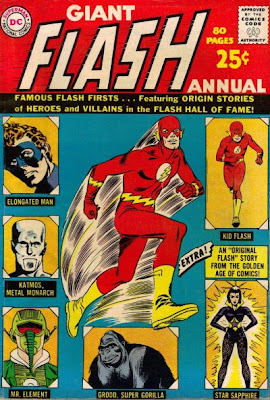
This comic, one of the true Silver Age "keys" appeared on the newsstands on March 31, 1959. Although DC had toyed with the idea of a female version of Superman on several occasions, this was the first that they decided to accept such a character on an on-going basis.
It was also the first time since about 1939 that the cover of Action featured a story that was not the Superman story. Yep, Supergirl did not appear in the Superman story, rather she popped up in her very own feature.
The Superman story in this issue featured Metallo. Although I didn't know it at the time, the concept of Metallo had appeared on a few occasions in the past; indeed when one was encountered in an early World's Finest, Lois Lane referred to it as "a Metallo" as if there were quite a few out there. The concept in the DC universe always amounted to a man inside a robot's body, and such was the case here.
John Corben, a reporter, has just committed the perfect crime, murdering the only man who knew he was guilty of being an embezzler. But in a moment he is shattered when his car crashes off a hillside. Fortunately a professor happens by who can save his life, but at quite a cost:

The only thing that can keep his body ticking is uranium, or another element. Unfortunately the professor keels over of a stroke before he can tell Metallo of the second source of power. Corben discovers that he has super strength with his new body. He gets a job at the Daily Planet, where he astounds Clark with his steel grip. But Lois is less impressed when Corben tries to hustle her.
Corben commits several robberies to build up a reasonable stockpile of uranium, but he'd rather have the second element which can last indefinitely. Fortunately the professor has recovered and advises Corben that what he really needs is Kryptonite, a small sample of which he has in a safe. Corben takes the Kryptonite, intending to use it to kill Superman. He wedges it near some pipes in a museum where Superman is about to make an appearance, and puts another sample of Kryptonite which he found in the museum in his body to power it.
But Superman manages to stay alive by focusing the heat of his x-ray vision on the Kryptonite, melting it. And Metallo finds out that the sample of Kryptonite at the museum was phony, and dies.
Comments: Clearly this story was inspired by the famous Atom Man story from the Superman radio show, where a German was injected with Kryptonite which gave him tremendous powers. The young man joined the staff of the Daily Planet and attempted to kill Superman.
The second story features Congo Bill as Congorilla. Congo Bill was a longtime DC character, having debuted in More Fun Comics #56. He switched over to Action with #37, and thus this was his 216th appearance in that magazine. A few years earlier he had gained the power to exchange bodies with a golden gorilla, giving him great strength. In this story, Congo Bill foils a plot by some French Foreign Legion mutineers.
Now we come at last to the reason why this comic is so highly prized by collectors: the debut of Supergirl! Here's her first in-story appearance:

A rocket from Krypton has landed on Earth, and the above is what Superman sees.
Now the decision to make her a girl caused some plot problems. Since Superman was a baby when Krypton exploded, it should be obvious that anyone so much younger than he could not have been born on that planet. Supergirl explains a chunk of Krypton called Argo City was thrown off into space when the planet exploded, with a group of survivors and sufficient atmosphere to support them. However, they did have one problem; the ground had turned into Kryptonite:

That scene of the workers rolling out the lead would be shown many times in the Silver Age; along with the shrinking of Kandor, it was one of the most-reprinted sequences. Zor-El and his wife would eventually have a daughter, Kara. Unfortunately a meteor shower punctured the lead, dooming the residents of Argo City. But Zor-El saved his daughter by sending her to Earth in a small rocket.
The echoes of Superman's own origin are obvious, but the pair discovered another link between them:

As a new relative for Clark would attract suspicion, Superman puts Kara into an orphanage in the town of Midvale, with instructions not to let anybody know that a Supergirl exists. She adopts the name Linda Lee and a brown, pigtailed wig as her disguise.

Comments: It is difficult to overstate the importance of Supergirl. Although DC had made fits and starts towards introducing female counterparts for their male heroes, such as Batwoman, Lady Blackhawk and Miss Arrowette, this was the only time between the late 1940s and the late 1960s that a new female superhero was given her own feature right off the bat. And she appeared in Action Comics, one of the biggest-selling comic magazines in the country. In addition, Supergirl got a big boost from being part of the Superman family, as she very quickly began making guest appearances in Lois Lane and Jimmy Olsen (especially after her existence was announced to the world).
Supergirl is, by a wide margin, the most important female character in comics during the Silver Age. Only Wonder Woman even has an argument, and given the wretched state of that feature during the 1960s, I don't think many people will make the case.
Update: Superman was not the only major DC character who got a significant addition to his family 50 years ago today.







































